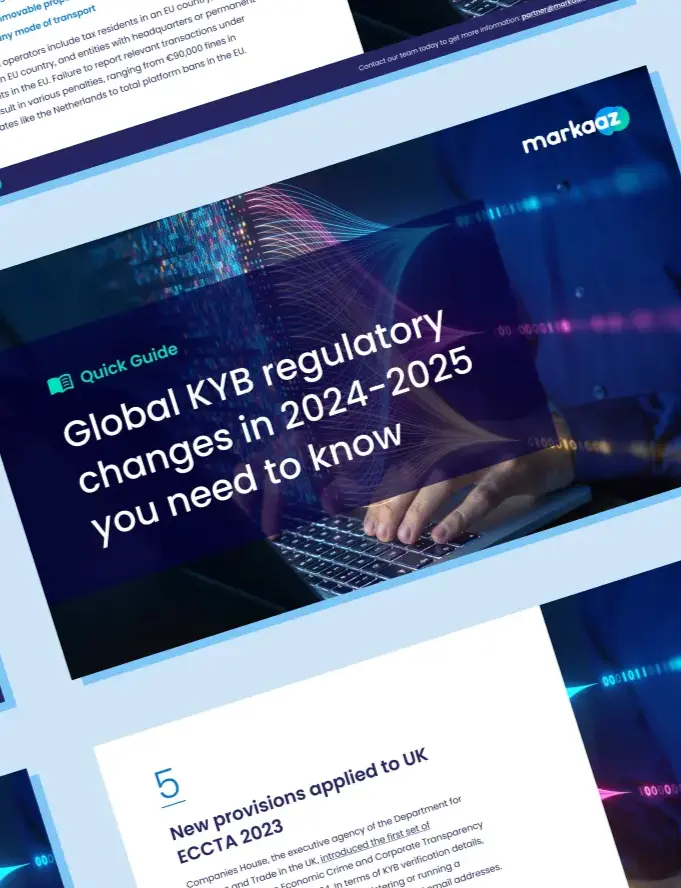Business verification is a crucial step in an enterprise’s onboarding process, but it can also be challenging. Inaccurate results can lead to approving bad actors or rejecting legitimate business customers. While the industry has made progress in data capabilities and technology solutions, enterprises still struggle to verify businesses accurately and efficiently.
One of the reasons for this is that many enterprises still rely on manual verification. Manual verification is time-consuming, expensive, and demanding on resources, and often produces false and inaccurate results. This increases the risk of fraudulent activities and raises compliance concerns for businesses.
Business verification APIs offer a solution to these challenges by automating the verification process and eliminating the need for manual efforts. These APIs source data directly from specific sources, allowing for real-time business identity verification. This not only improves the accuracy of client verification but also streamlines the onboarding process, enabling faster verification of potential clients. In this article, we will explore three benefits of business verification APIs and explain how you can use these tools to transform your onboarding process.
Automation can help catch important data signals that prevent illegitimate business approvals
Not all potential clients can be trusted. Some try to exploit verification processes by providing false information or withholding crucial details needed for a proper risk assessment. For US banks, new account creation accounted for 36% of fraud losses in 2022.
Important data such as business health information (credit risk score, bankruptcy data, failure risk ratings) and firmographic data (legal business name, director information, location, legal status, web address) may be omitted or incorrect. These data elements, however, are essential for making informed decisions when onboarding potential business customers.
Manual verification can leave onboarding or compliance teams struggling to validate business customer information. It becomes time-consuming, costly, and sometimes impossible to cross-reference client information with the data sources needed to validate user identities, detect discrepancies, and identify potential risks. As many as 68% of organizations say they fail to leverage the majority of data available to them.
Business verification APIs enable enterprises to securely and accurately verify the legitimacy of potential clients. These APIs analyze patterns and historical data to identify fraudulent businesses or suspicious activities. By flagging potential risks, these automated solutions help prevent fraudulent transactions and protect businesses from financial losses.
Businesses in all sectors can benefit from business verification APIs to minimize the risk of illegitimate clients and fraudulent activities, especially those involved in monetary transactions and personal accounts. Common use cases include:
- Insurance providers: Business verification APIs help insurance providers authenticate customers for insurance policies by validating important business information such as business status, registration details, financial stability, ownership details, and risk indicators.
- Financing and credit: Banks and financial institutions can use business verification APIs to increase security and minimize risk when small and medium-sized businesses (SMBs) apply for loans or credit. These APIs gather data on credit history, financial statements, cash flow, market and industry analysis, debt obligations, collateral, and more.
- E-commerce platforms: Online stores and marketplaces can utilize verification APIs to authenticate third-party sellers, reducing the risk of accommodating fraudulent businesses on their platforms.
Markaaz’s Business Verification API Suite leverages the Markaaz Directory, which contains over 300 million global business records. This API suite searches the directory to gather accurate business health data and firmographic information based on a customized selection of over 200 data points. It also uses advanced algorithms to examine name variations and potential inaccuracies in databases and forms, resulting in a more precise assessment of customer legitimacy within seconds. By flagging any issues in real time, it minimizes the risk of illegitimate clients moving through the onboarding process.
APIs can help ensure compliance and mitigate risk with comprehensive AML database validation
Businesses, particularly those in the financial sector, must adhere to regulations and industry standards when onboarding clients. Compliance requirements such as Know Your Business (KYB) and Anti-Money Laundering (AML) are critical. Failure to comply can lead to intervention from regulatory bodies such as the SEC or FTC, as entering into contracts with non-AML-compliant SMBs may unknowingly facilitate money laundering or criminal financing. This can result in reputational damage, loss of trust, severe penalties, and legal consequences. In 2022, fines for non-compliance with financial services regulations totaled $4.17 billion and enforcement actions for AML-related compliance breaches soared globally by 52%.
Business verification APIs play a crucial role in confirming a business’s involvement in money laundering or terrorist financing activities by validating against AML databases. These APIs compare business details with watchlists and sanction lists to identify high-risk entities, enabling financial institutions and other organizations to comply with regulatory requirements and prevent fraudulent transactions. The significance of the frequency and timeliness of compliance data also plays a critical role. Outdated or incomplete information can create gaps, hindering the identification of high-risk entities and exposing vulnerabilities to potentially fraudulent activities.
Markaaz’s Business Verification API Suite helps businesses stay ahead of regulatory requirements by enabling real-time, accurate data verification to ensure the legitimacy of new SMB clients and minimize the risk of fraud. The Markaaz Directory allows enterprises to identify high-risk clients before establishing a relationship, screening applicants against all possible sanction lists, watchlists, Politically Exposed Persons (PEPs), and adverse media to reduce the risk of association with fraudulent or illicit activities.
APIs can scale business verification for large portfolios
As enterprises grow, they need the ability to onboard clients quickly and expand their SMB ecosystem. Manual verification and approval processes make it challenging to keep up with the increasing demand, hindering business growth.
Business verification APIs offer scalability and flexibility to seamlessly handle a growing number of clients and data integration requirements. Markaaz’s Verification API Suite applies comprehensive, tailored metrics to provide instant verification results and approval decisioning on whether new business customers should be approved, rejected, or require further due diligence. These metrics are based on preconfigured rules set by your organization, providing personalized recommendations in real-time. Businesses can easily see which metrics were assessed for each client and focus on those that require additional verification. This allows the API to onboard clients rapidly without compromising accuracy, regardless of the increased demand.
Scalability is especially important for businesses experiencing rapid growth or onboarding thousands of new customers daily. Typical use cases include:
- Digital marketplaces: E-commerce platforms and online marketplaces, known for their rapid growth, can efficiently onboard businesses in large numbers by validating the legitimacy and compliance of high-volume customer lists.
- FinTechs: Business verification APIs help fintech companies manage a growing number of clients while quickly and efficiently verifying critical business information, including registration details, financial stability, and compliance information.
- Lenders: Lenders can use business verification APIs to automate the verification of business information, including financial statements, credit history, and compliance checks. This enables them to make informed lending decisions while processing a large volume of loan applications.
Bring fast, accurate verification to your customer onboarding
In conclusion, business verification APIs play a vital role in streamlining the onboarding process and ensuring the accuracy and legitimacy of potential clients. However, it’s important to recognize that the quality of the data that these APIs rely on is equally crucial. The effectiveness of business verification hinges on accessing reliable and comprehensive information.
At Markaaz, we understand the significance of high-quality data. That’s why our Business Verification API Suite leverages the Markaaz Directory, which consists of an impressive collection of over 300 million global business records. What sets our data apart is its unparalleled accuracy in the industry. We have painstakingly aggregated data from multiple authoritative sources and employed a proprietary data matching algorithm, resulting in the most precise and reliable records available.
By combining the exceptional quality of our data with our automated and integrated APIs, we provide a powerful solution that brings together speed and accuracy—the two essential components of effective business verification. With Markaaz, you can accelerate and improve your business verification results while ensuring the utmost accuracy and reliability.
Experience the transformative impact of Markaaz’s Business Verification APIs and our unrivaled data quality. Contact a member of our team today to learn how we can enhance and expedite your customer onboarding process.



